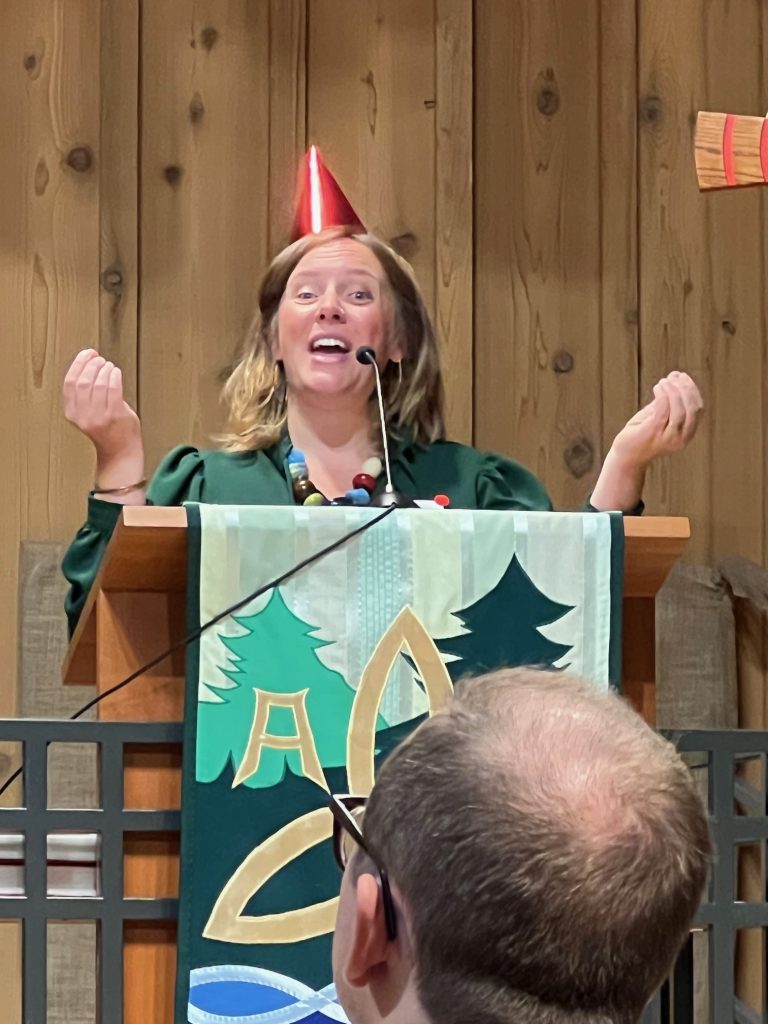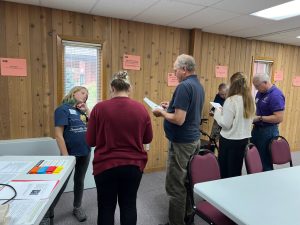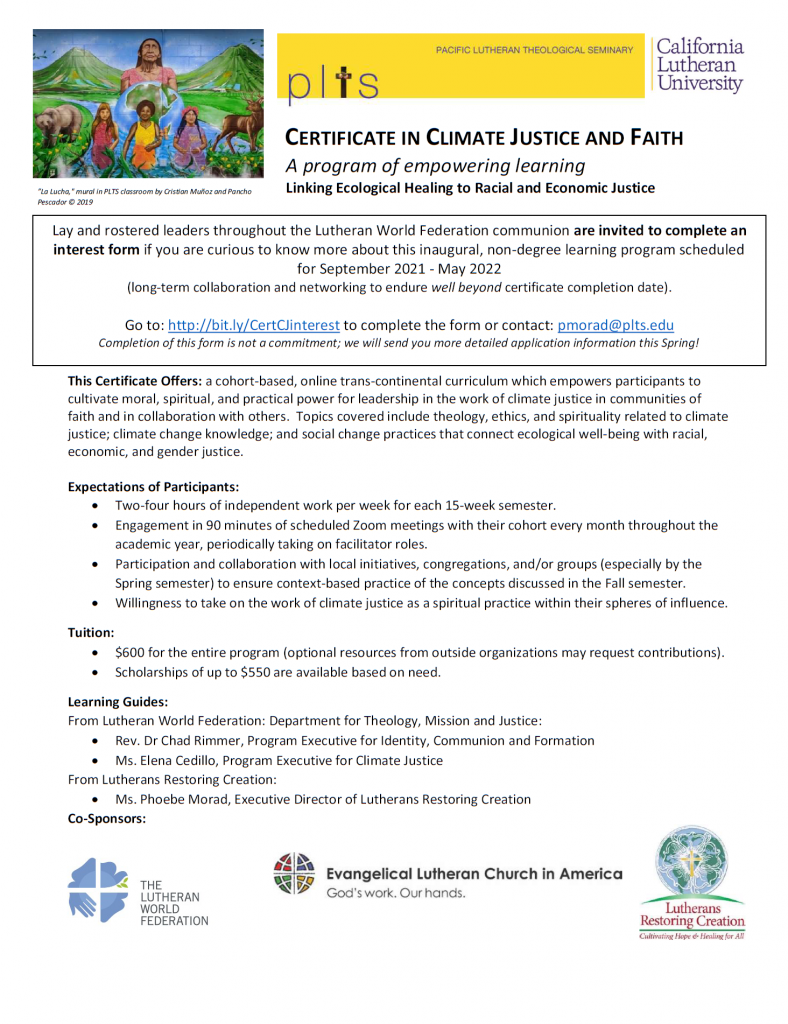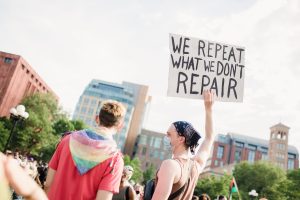March 22 marks the 31st annual World Water Day, a United Nations observance to celebrate the progress the world has made in providing access to clean, safe water for all and to remember how far we have to go as a global community toward that goal.
This week, the UN will host an international conference on water in New York City to commemorate World Water Day and to encourage “bold action” in pursuit of the Sustainable Development Goal of “clean water and sanitation for all.” The ELCA will be represented at the conference by staff from the Building Resilient Communities team and the Lutheran Office for World Community, learning and sharing together with other faith-based groups, governmental actors and organizations. Reaching the goal of clean water and sanitation for all is critical. As the conference announcement shares, “Water is a dealmaker for the Sustainable Development Goals, and for the health and prosperity of people and planet.” Indeed, without access to clean water and sanitation, many of the other Sustainable Development Goals will be out of reach.
Water and Hunger
This is especially true of the goal of ending hunger. Projects and initiatives that provide access to clean water and sanitation have long been part of the work supported by ELCA World Hunger. And with good reason. Northwestern University anthropologist Hilary Bethancourt notes, “In some cases, the most sustainable way to improve food security may be through improving water security.” Bethancourt and a team of researchers found in a 25-country study that people who frequently faced water insecurity[1] were nearly three times as likely to face food insecurity as those who did not.
What might be surprising is that one of the few longitudinal studies of water and food insecurity found that water insecurity actually precedes and may predict future food insecurity. So, rather than occurring together due to a single cause, water and food insecurity interact, with water insecurity actually occurring before food insecurity.
Similar dynamics are found in research in the United States. A study published last year examining tap-water avoidance found that food insecurity was more than 20% higher among the 61.4 million Americans who do not use tap water than among those who do use tap water.[2] What the study suggests is that access to – and use of – clean, safe, affordable tap water can help reduce the risk of hunger.
Addressing access to water is important, too, for solutions to hunger. As Manuel Fontaine, UNICEF Director of the Office of Emergency Programmes, has said bluntly, “No matter how much food a malnourished child eats, he or she will not get better if the water they are drinking is not safe.”
Perhaps even more startling are the results of a study involving 69 experts from around the world. When asked by researchers to identify the top threats from extreme events to global food security, the four most common responses involved water, while 6 of the 32 threats identified directly mentioned water.
Water and Sanitation by the Numbers
Where do we stand with progress on clean water and sanitation? What are some of the realities that are behind the “global water crisis”?
- 2 billion people lack access to safely managed water.[3] The rate of people with access to safely managed water services increased from 70% in 2015 to 74% in 2020.
- That number includes 2 billion people who lack access to basic drinking water services.[4]
- By 2025, half of the world’s population could be living in water-stressed areas.
- 6 billion people around the world lack access to safely managed sanitation services, which puts them at higher risk of waterborne illnesses.
- Diarrhea resulting from unsafe water and insufficient access to adequate medical care claims an estimated 829,000 lives every year.
Some progress has been made, but we are not yet on track to reach the Sustainable Development Goal of clean water and sanitation for all. This makes the question raised Rev. Philip Vinod Peacock of the Church of North India, in his reflection on the words of Jesus, all the more poignant: “While the offer of living water is made, how come many still cry, ‘I thirst’”?[5]
Water and Power
Water scarcity affects communities in nearly every country around the globe, and the number of people facing water crises continues to grow. But that doesn’t mean the burden is shared equally. As Peacock notes about his context in India,
“The issues of water scarcity and pollution and its resulting impact…are closely connected with issues of justice and peace, caste and gender.”[6]
In discussions of water crises, Peacock writes, “another issue that has to be taken seriously…is the place of power relations.”[7] His co-authors in Waters of Life and Death: Ethical and Theological Responses to Contemporary Water Crises offer examples of the many ways water scarcity reflects and springs from marginalization and injustice, from the displacement of Dalit and indigenous Adivasi communities by large dam projects (J. Jeremiah Anderson) to the theft of groundwater in the village of Plachimada by Coca-Cola (Philip K.J.)
Their sentiments are echoed by Catholic ethicist Christiana Zenner:
“Clean water flows toward power.”[8]
Without a doubt, there is a global water crisis – or, rather an interlocking set of water crises – with a rippling impact. But the water crisis is not just a hydrological or ecological crisis. It is a political and economic crisis. We see this in the racial disparities in water access here in the United States, where people of color are more likely to live in homes without full plumbing for clean water or sanitation and where water systems are more likely to violate the Safe Drinking Water Act in communities of color and in communities with households with low-income. The likelihood of a water system protecting residents from unsafe water decreases in communities as the proportion of people of color and households with low income increase.
Along with racial and economic disparities are clear gender inequities when it comes to water. In areas without basic drinking water services, the burden of water scarcity and lack of sanitation often falls on women and girls, who are typically responsible for collecting water for their households. The time spent on this, according to UNICEF, could be as high as 200 million collective hours each day.[9] A study on sanitation found that girls also bear the brunt of lack of sanitation facilities in schools. In a study of West African countries, WHO/UNICEF found that 15-25% of girls missed school during their period, in part due to a lack of adequate sanitation facilities and resources, such as running water, soap, sanitary supplies or waste bins.
Ripples of Hope
The communities ELCA World Hunger is invited to accompany inspire hope that change is possible, despite the complex undercurrents of injustice that flow beneath the global water crisis. This hope is rooted in movements that not only provide clean, safe water but that open opportunities for local communities and neighbors to make meaningful decisions about their own ecological future. Each of these stories – from microbasin restoration in El Salvador to awareness-raising and advocacy to reduce lead contamination in Milwaukee, from drought-resistant agriculture in Bangladesh to rainwater harvesting in Zimbabwe – is a step toward providing clean water or sanitation and an invitation to bear witness to the effective solutions that can come from communities working together for change.
We have a long way to go. But in faith, we journey together with neighbors and companions, taking seriously the words of Rev. Atle Sommerfeldt, the former General Secretary of Norwegian Church Aid:
Water is too important a matter to be left to politicians and technicians alone. Water must be an integral part of our spiritual and social agenda in every local community and nation.”[10]
Commemorating World Water Day
This World Water Day, and the gathering times that follow it, set aside time to pray for neighbors near and far facing water scarcity and water injustice, and give thanks for the local leaders whose tireless efforts inspire us with hope.
With your congregation or your household, use one of ELCA World Hunger’s educational resources to learn more about water and hunger:
Water and Hunger Toolkit
River of Life Vacation Bible school
Want to plan a larger event for this Spring or Summer? You can also check out ELCA World Hunger’s Walk for Water, an interactive track experience with a complete DIY guide.
Ryan P. Cumming, Ph.D., is the interim director of education and networks for the Building Resilient Communities team in the ELCA churchwide organization.
—————-
[1] “Water insecurity” can be defined as lacking reliable access to clean, safe and sufficient water to support livelihoods and human well-being. This is related to other terms such as “water stress” or “water scarcity.” Water scarcity generally describes the relationship between supply and demand, while water stress is a bit broader, encompassing not just adequate availability but dependable and sufficient access. See Young SL, et al.. Perspective: The Importance of Water Security for Ensuring Food Security, Good Nutrition, and Well-being. Advances in Nutrition. 2021 Jul 30;12(4):1058-1073.
[2] The reasons for tap water avoidance can vary. This can include a lack of adequate plumbing, safety or contamination concerns, shut-offs due to lack of payment, and lack of trust in municipal services and government.
[3] The World Health Organization (WHO) and the United Nations Children’s Fund (UNICEF) define “safely managed drinking water service as “an improved water source that is accessible on premises, available when needed and free from faecal (sic) and priority chemical contamination. Improved water sources include: piped water, boreholes or tubewells, protected dug wells, protected springs, and packaged or delivered water.”
[4] WHO and UNICEF define a basic drinking water service as “drinking water from an improved source, provided collection time is not more than 30 minutes for a round trip.”
[5] Philip Vinod Peacock, “Water Conflict,” in Sam P. Mathew and Chandran Paul Martin, eds. Waters of Life and Death: Ethical and Theological Responses to Contemporary Water Crises (Chennai: UELCI/ISPCK, 2005), 65.
[6] Ibid, 64.
[7] Ibid, 63.
[8] Christiana Zenner, Just Water: Theology, Ethics, and Fresh Water Crises (Maryknoll: Orbis, 2018).
[9] This estimate was derived by calculating the number of women and girls living in areas where water sources are more than 30 minutes away from the home.
[10] In Mathew and Martin, eds., xi.








